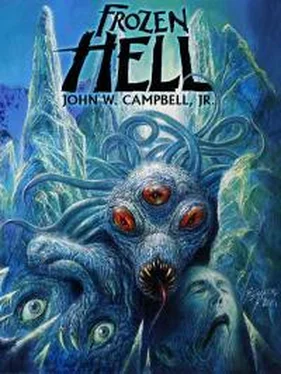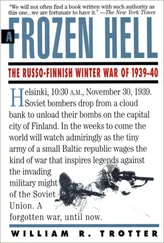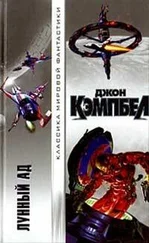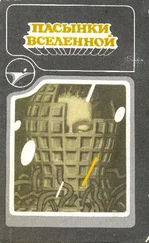Джон Кэмпбелл - Frozen Hell
Здесь есть возможность читать онлайн «Джон Кэмпбелл - Frozen Hell» весь текст электронной книги совершенно бесплатно (целиком полную версию без сокращений). В некоторых случаях можно слушать аудио, скачать через торрент в формате fb2 и присутствует краткое содержание. Год выпуска: 2019, Издательство: Wildside Press, Жанр: Фантастика и фэнтези, на английском языке. Описание произведения, (предисловие) а так же отзывы посетителей доступны на портале библиотеки ЛибКат.
- Название:Frozen Hell
- Автор:
- Издательство:Wildside Press
- Жанр:
- Год:2019
- ISBN:нет данных
- Рейтинг книги:3 / 5. Голосов: 1
-
Избранное:Добавить в избранное
- Отзывы:
-
Ваша оценка:
- 60
- 1
- 2
- 3
- 4
- 5
Frozen Hell: краткое содержание, описание и аннотация
Предлагаем к чтению аннотацию, описание, краткое содержание или предисловие (зависит от того, что написал сам автор книги «Frozen Hell»). Если вы не нашли необходимую информацию о книге — напишите в комментариях, мы постараемся отыскать её.
Frozen Hell — читать онлайн бесплатно полную книгу (весь текст) целиком
Ниже представлен текст книги, разбитый по страницам. Система сохранения места последней прочитанной страницы, позволяет с удобством читать онлайн бесплатно книгу «Frozen Hell», без необходимости каждый раз заново искать на чём Вы остановились. Поставьте закладку, и сможете в любой момент перейти на страницу, на которой закончили чтение.
Интервал:
Закладка:
But if it’s real…
CHAPTER ONE
Army Corps of Engineers
Special Operations Base, Antarctica
“I didn’t sign up for this,” groaned Pete Garvin, throwing down his pickaxe and twisting first left, then right to stretch out his back and shoulder muscles. “Three months of digging, and all I’ve got are pains where I didn’t know I had muscles.”
“You and me both, brother,” said Clay Washington. A burly African-American, he had been—until three months ago—head of the Antarctic Geo-survey Team, as well as Garvin’s boss. They had both signed on with General Wu’s team, helping to dig down through the glacier toward their discovery—whatever it turned out to be. A meteor? A spaceship? A frozen dinosaur whale (one of the wilder theories)? One guess was as good as another at this point.
He turned and gazed up the ice tunnel. Fifteen feet wide, ten feet high, with steel brace beams every six feet, it seemed to stretch to infinity, though he knew it only ran six-hundred feet to a switchback. The tunnel turned there, ran almost seven hundred more feet, and switchbacked again, before you finally reached the surface, with its semi-permanent buildings surrounding the tunnel mouth.
Arc lights and space heaters set every thirty feet ran the entire length. Between the lights, heaters, and the heavy digging equipment a hundred feet farther down, the tunnel temperature sometimes soared to a toasty 30°, though mostly it lingered at 28°. A series of wall-mounted fans hummed like a swarm of killer bees, circulating the air but doing little to relieve the months-old stench of human sweat and motor oil and exhaust fumes.
Pete sat on an outcropping of ice, sucking in huge gulps of air. For a minute he paused to watch men with jackhammers attacking the wall of ice at the end of the tunnel. Ice-dust and ice-chips flew. He and Clay had what the others called “easy work”—smoothing out the roughest parts of the walls so the mini-bulldozers and the golf carts could pass each other in the tunnel with comfortable safety.
The glacial ice grew harder the deeper they penetrated. We’re measuring progress by the foot, he told himself. Even so, progress was steady.
A string of curses erupted behind him. He glanced over his shoulder at the team of Army engineers, struggling to reinforce a set of steel girders that had begun to buckle. No one wanted the tunnel to collapse before they reached their goal.
The clatter of the jackhammers abruptly ceased. Pete turned his attention back to the men who had been working on the wall. The mini-bulldozer roared to life, zipped over, and began scooping up debris. It would ferry everything up to the surface and dump it a hundred feet from camp.
We must be getting close, Pete thought. He squinted at the rough wall of ice at the end of the tunnel. How much farther? The Army Corps of Engineers had designed a gently sloping down-ramp, and the team had turned the final corner two weeks ago. It should be smooth sailing the rest of the way.
Excited shouts rose from the men by the bulldozer. The driver cut its motor and climbed down from the cab. Everyone gathered in a circle.
Clay craned his neck. “I think they found something.”
“Come on, let’s take a look.” Without waiting for a reply, Pete rose and trotted down the grade to where men now gathered in front of the bulldozer’s shovel. Finally something to break the monotony of digging.
Clay fell in step beside him.
“—better call the General,” Corporal Menendez was saying, as they joined the circle corps workers. She was in charge of this work shift. “He’s going to want to see it.”
“He flew to the South Pole station this morning,” someone said.
“Radio him. Hammond, take care of it.”
“Yes, Corporal.” Hammond trotted over to a golf cart, got in, and zipped up the tunnel.
Pete stared down at a broken-off blade of metal jutting from a chunk of ice as big as a man’s torso. Under the bright arc lights, the blade gleamed silver. One side curved at a mathematically precise angle. Part of something round?
“That looks machined,” he said.
“Yeah,” Menendez said. “Definitely machined.”
Pete tried to visualize it whole. It might have been eight or ten feet across.
“Give me your pick, Smitty,” Menendez said.
Pete held his breath as Menendez knelt, accepted a hand-pick from one of the other engineers, and struck the block of ice as hard as she could—once, twice, a third time. Chips flew. Finally, with a sound like cracking knuckles, the block split in half.
Menendez dug gloved fingers into the gap and flipped the two halves apart, revealing more of the blade. The curved section extended another foot, then ended in jagged, twisted metal. Using the pointed end of the hand-pick, she pried it loose.
Standing, Menendez turned the blade over, examining it carefully,
“Well?” Pete finally demanded.
“I’ve seen damage like this in war zones. There must have been an explosion—a big one.” She looked up. “There’s probably wreckage all through the ice. But the weird thing…” She paused, swallowed hard. “The weird thing is, it feels like it doesn’t weigh anything at all. Look!”
She dropped it—but instead of thudding to the ground, the metal settled slowly, like a feather drifting to earth. She picked it up and passed it to the next man, who repeated the experiment.
So it went around the circle. Pete got it last, after Clay—and just like Menendez had said, it felt like it weighed nothing at all in his hands. But it was strong and hard and cold. He couldn’t bend it.
He returned it to Menendez, who hefted it, then used the blade of her hand-pick to try to scratch it. Other than a blood-chilling scree-ee-ee , her efforts had no effect.
“Not even a scratch,” she murmured.
Silence fell. Everyone stared—at the corporal, at the broken blade of metal, at each other.
Pete asked, feeling his heart skip a beat, “ Is it man-made?”
“Not… man ,” said Menendez slowly. “This is nothing I’ve ever seen before. Like nothing on our planet.”
Pete barely contained a whoop of triumph. Not a meteorite. Not a frozen giant whale. It had to be a spaceship!
He slapped Clay on the back. “It’s real, man! We found aliens! We’re gonna be famous!”
Then suddenly everyone was talking at once—babbling about aliens, spaceships, the piece of metal.
“Quiet down, quiet down!” Menendez yelled. Silence fell like a switch had been thrown. “We don’t know anything at this point. It’s just a piece of metal—nothing else. Don’t get ahead of yourselves.”
“Are there more pieces?” Pete asked.
“There have to be,” Menendez said. “It must be part of a debris field.” She gestured at the wall. “Everyone—spread out and look.”
Her men began unclipping flashlights from their belts. Pete remembered that he had one, too, and fumbled it out. The engineers pressed the lenses against the wall, playing the beams through the ice, casting weird shadows that bounced from fracture mark to fracture mark.
“I’ve got something!” one man called.
“Me too!” said another. “Looks like more metal.”
“And here!” Clay shouted.
Six inches into the wall, Pete’s beam came to rest on something large and dark. He squinted. What was it? Not metal. A strange, black, vaguely fuzzy outline of… something .
He slid the beam up, around a shoulder-like curve, to what might have been a head…and then up and over to a single red eye, frozen open, that glared out at him from the depths of the ice.
Читать дальшеИнтервал:
Закладка:
Похожие книги на «Frozen Hell»
Представляем Вашему вниманию похожие книги на «Frozen Hell» списком для выбора. Мы отобрали схожую по названию и смыслу литературу в надежде предоставить читателям больше вариантов отыскать новые, интересные, ещё непрочитанные произведения.
Обсуждение, отзывы о книге «Frozen Hell» и просто собственные мнения читателей. Оставьте ваши комментарии, напишите, что Вы думаете о произведении, его смысле или главных героях. Укажите что конкретно понравилось, а что нет, и почему Вы так считаете.


![Джон Кэмпбелл - Из мрака ночи [Сборник]](/books/28063/dzhon-kempbell-iz-mraka-nochi-sbornik-thumb.webp)







![Джон Кэмпбелл - Острова в космосе [litres с оптимизированной обложкой]](/books/433450/dzhon-kempbell-ostrova-v-kosmose-litres-s-optimizi-thumb.webp)